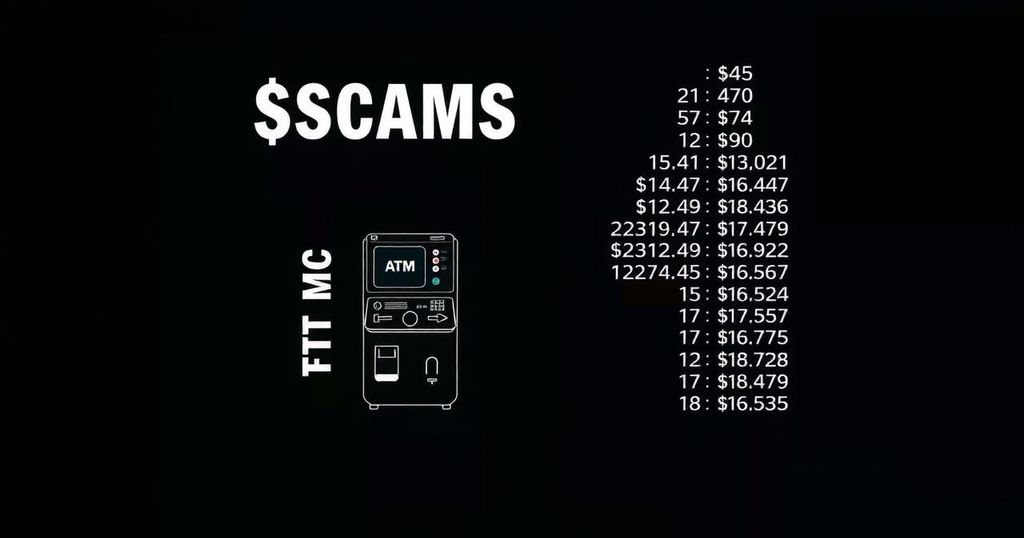The Surge of Bitcoin ATM Scams: A $65 Million Crisis in 2024
Summary
Bitcoin ATM scams have cost individuals $65 million in the first half of 2024, according to the FTC. These scams often involve impersonation tactics and mislead victims into believing that depositing cash will protect their accounts. The FTC emphasizes the importance of vigilance, particularly for older adults, who have been disproportionately targeted by these schemes.
Scams involving Bitcoin ATMs (BTMs) have surged, resulting in significant financial losses for individuals, amounting to $65 million in the first half of 2024, as reported by the Federal Trade Commission (FTC). These machines, which are increasingly found at convenience stores and gas stations, are intended for purchasing and sending cryptocurrencies. However, they have come to be exploited by fraudsters who target unsuspecting victims. The scams primarily manifest in forms such as government impersonation, business impersonation, and tech support scams. Victims receive initial contact through various channels, including phone calls, online advertisements, and emails. Scammers may alert individuals to purported suspicious activity on their accounts or initiate contact with fake security warnings, often masquerading as reputable companies. In these schemes, individuals are often misled into believing that depositing cash into Bitcoin ATMs will safeguard their accounts or rectify the fictional issues presented by the scammers. For instance, 83-year-old Peggy Herbert recounted her experience of being tricked into withdrawing $34,000 after receiving a fraudulent alert on her iPad. She stated, “I got the alert on my iPad… alert, alert … call this number … your account has been compromised.” Fortunately, police recovered her funds; however, many victims are not so fortunate. To mitigate the risk of falling prey to such scams, the FTC provides several recommendations: 1. Refrain from clicking on links or responding to unsolicited calls, messages, or pop-ups. Instead, verify any claims by independently contacting the company or agency using contact information obtained through official channels. 2. Take your time; scammers often attempt to create a sense of urgency. Speak with a trusted individual before taking any action. 3. Avoid withdrawing cash in response to unsolicited communications, as legitimate entities will never request this. 4. Do not trust assertions that using a Bitcoin ATM, purchasing gift cards, or transferring funds is necessary to protect one’s money. 5. Be particularly vigilant, as individuals aged 60 and over constitute a significant proportion of reported scam victims this year. Conversations with seniors about recognizing and avoiding such schemes are essential. Peggy Herbert advises, “Hang up. Call someone in your family or call someone, a friend. Be careful of these sophisticated schemes.”
Bitcoin ATMs, or BTMs, have become increasingly popular as a means for consumers to buy and send cryptocurrencies. However, their proliferation coincides with a rise in scams targeting these machines, leading to substantial monetary losses for victims. The fraudulent schemes often involve sophisticated impersonation tactics designed to confuse and coerce individuals into relinquishing their funds. The FTC’s report on the state of these scams highlights the growing need for public awareness and education to combat such frauds effectively. Furthermore, vulnerable populations, particularly seniors, are disproportionately affected by these scams, necessitating proactive measures to safeguard them.
In conclusion, the rise in Bitcoin ATM scams represents a significant threat to consumers, resulting in notable financial losses, particularly among vulnerable populations such as seniors. The FTC’s guidance offers vital strategies for individuals to protect themselves from falling victim to these fraudulent activities. Awareness and education are key in combatting these sophisticated scams, and individuals must remain vigilant and proactive in safeguarding their financial well-being.
Original Source: www.nbcboston.com








Post Comment